Number of juvenile birds
days of migration
KM to Spain
Update on Human-Led Migration 2025
Despite all efforts, the birds can now only be motivated to undertake local flights.
Although the consistent training has shown some success and the birds respond attentively on the ground to the calls of their human foster parents, they follow the aircraft only over short distances before turning back. Unfortunately, the training deficit from the summer can no longer be compensated.
Within the framework of this adjusted human-led migration, our only option now is to allow the birds to make stage-by-stage local orientation flights – giving them the chance to map these locations like beads on a string from the breeding grounds to the wintering area. We hope that this will enable them to find their way back to Bavaria as adult birds.
Wintering Area 2025
Due to the birds’ behavior and repeated delays, it is now clear that we will not reach Andalusia this year. Our new, closer destination is Empordà in Catalonia. There, the Alive Fund Foundation is establishing a colony modeled on the Andalusian one, consisting of both resident and migratory birds. Our 29 birds will become part of a group of around 60 young northern bald ibises that will be released in spring.
In three years, it will become apparent whether they return to Bavaria or breed locally. In either case, they will be significant founding individuals for the European northern bald ibis population.

Why spain?
Global warming is also becoming a challenge for the Northern Bald Ibis. The birds of the colonies in the northern foothills of the Alps are having increasing problems flying over the Alpine barrier in autumn. A new migration corridor to Andalusia should enable them to reach a suitable wintering area without being hindered by the barrier of the Alps.
Click here for the latest pictures and information:
Timetable for human-led migration 2025
KW 14 - 15
Collection of approximately 32 Northern Bald Ibis chicks at Rosegg Zoo (Carinthia).
KW 14 - 18
The chicks are hand-raised for the first few weeks in Rosegg (Carinthia).
KW 18 - 33
The birds are being raised and trained at the training camp in Taching (Bavaria).
Address:
Schröckenbauer 1
83373 Taching am See
Camp management:
Clara Renner
camp@waldrappteam.at
+49 1525 2424697
KW 50
Release of the HLM 2025 birds in Empordà (spain).
Migration Diary 2025
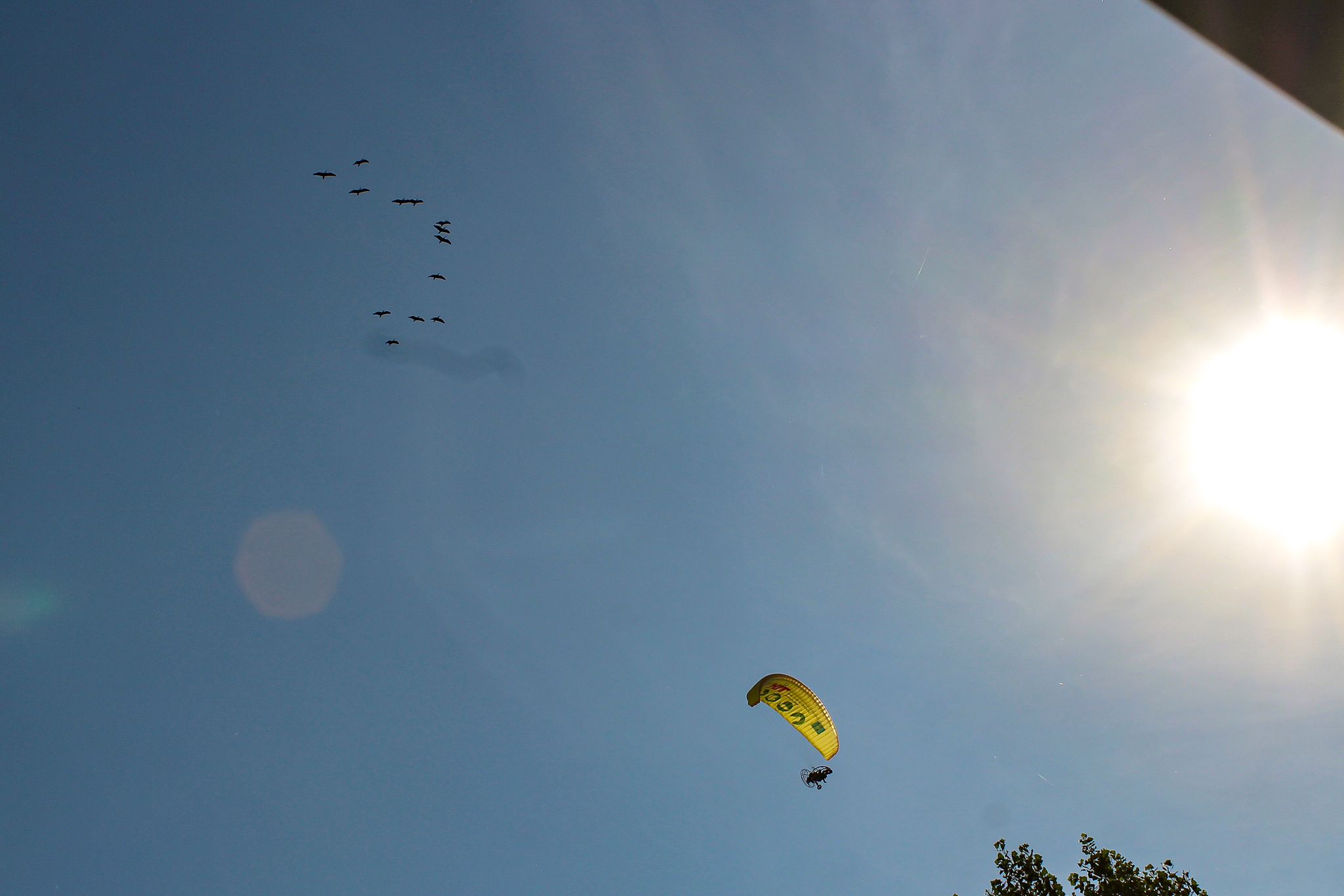
September 29th 2025
Migration finale. This morning, the flight team — consisting of pilot Johannes Fritz and foster mother Johanna Haas — completed a successful final flight under this year’s challenging conditions. The main group of birds already followed at least partway beyond the boundaries of the airfield near Perpignan.
After reducing the size of the group, the Northern Bald Ibises followed the aircraft for several more kilometers in the direction of the pass across the Pyrenees. Although the birds eventually turned back, they were able to complete another valuable orientation flight in this important region.
With that, the final mission of this extraordinary migration has been accomplished. The birds and the team are now traveling to their final destination for this year: the colony site of the Alive Foundation near Figueres.
📸 B.Steininger
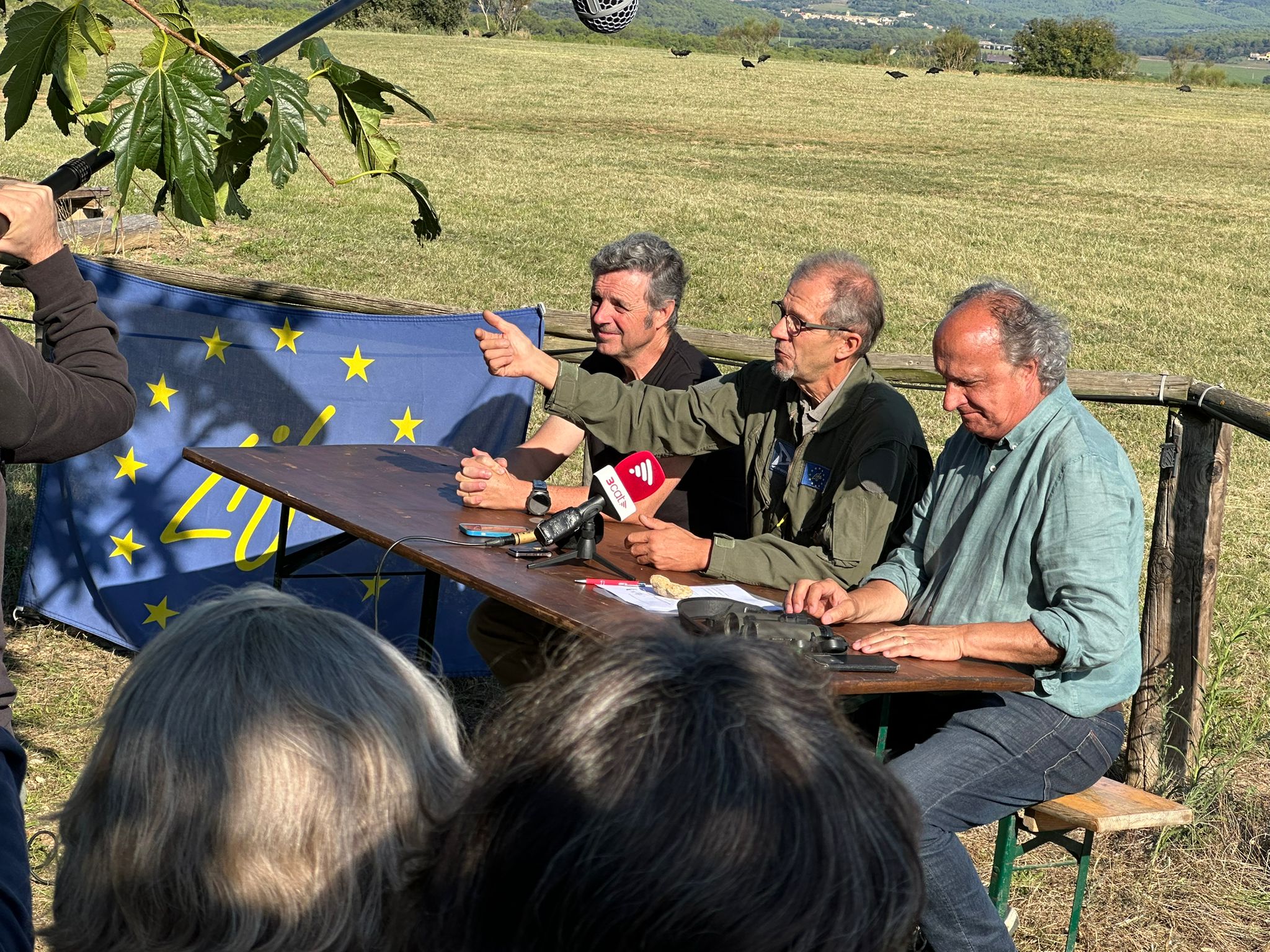
September 27th 2025
We were welcomed to Ordis under bright sunshine. After a short flight at the site, intended to help the birds further orient themselves, our arrival in Catalonia was announced during a press conference. With the signing of a Memorandum of Understanding, the collaboration between the Waldrappteam and the Alive Foundation was officially sealed.
The team also had the opportunity to visit, for the first time, the site of the colony established by the Foundation and to tour the aviary that has been specially expanded for our birds. There, our 29 Northern Bald Ibises will spend the time until their release together with the 19 hand-raised birds of the Alive Foundation.
Before bringing them to their final destination, we would like to give our birds another opportunity for an orientation flight near the Pyrenees.
📸 K.Ebel
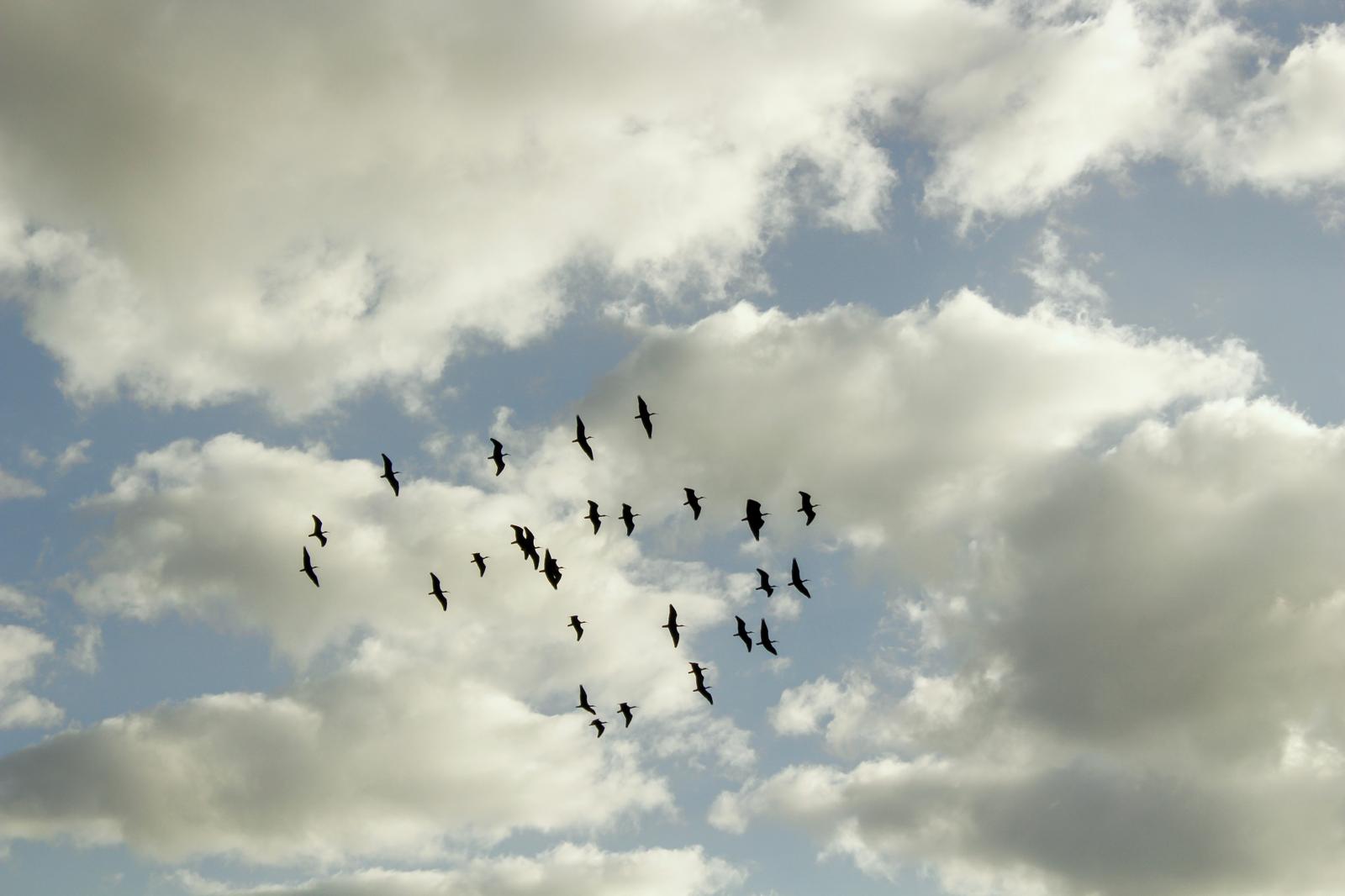
September 26th 2025
After an unsuccessful attempt to start with the entire group of birds, the plan to try again with a smaller part of the group was unfortunately thwarted by rising winds. Therefore, the birds were finally transported by car to Ordis.
We are delighted to have now reached the destination of our journey and to welcome our friends and colleagues from the Alive Fund Foundation. Our 29 birds are to be integrated into their newly established Northern Bald Ibis colony.
Since the Pyrenees represent an important section of the birds’ potential future migration route, and since they did not cross them in flight but traveled by car instead, we would like to give them, before bringing them to their final destination – the aviary site of the Alive Foundation – another opportunity for an orientation flight north of the Pyrenees, closer to the mountains, in the coming days.
Tomorrow, however, we look forward to the official arrival celebration in Catalonia, including a press event and a public orientation flight in Ordis. We expect up to 70 guests, including media representatives, interested visitors, and colleagues from our Spanish partner project.
📸 B.Steininger
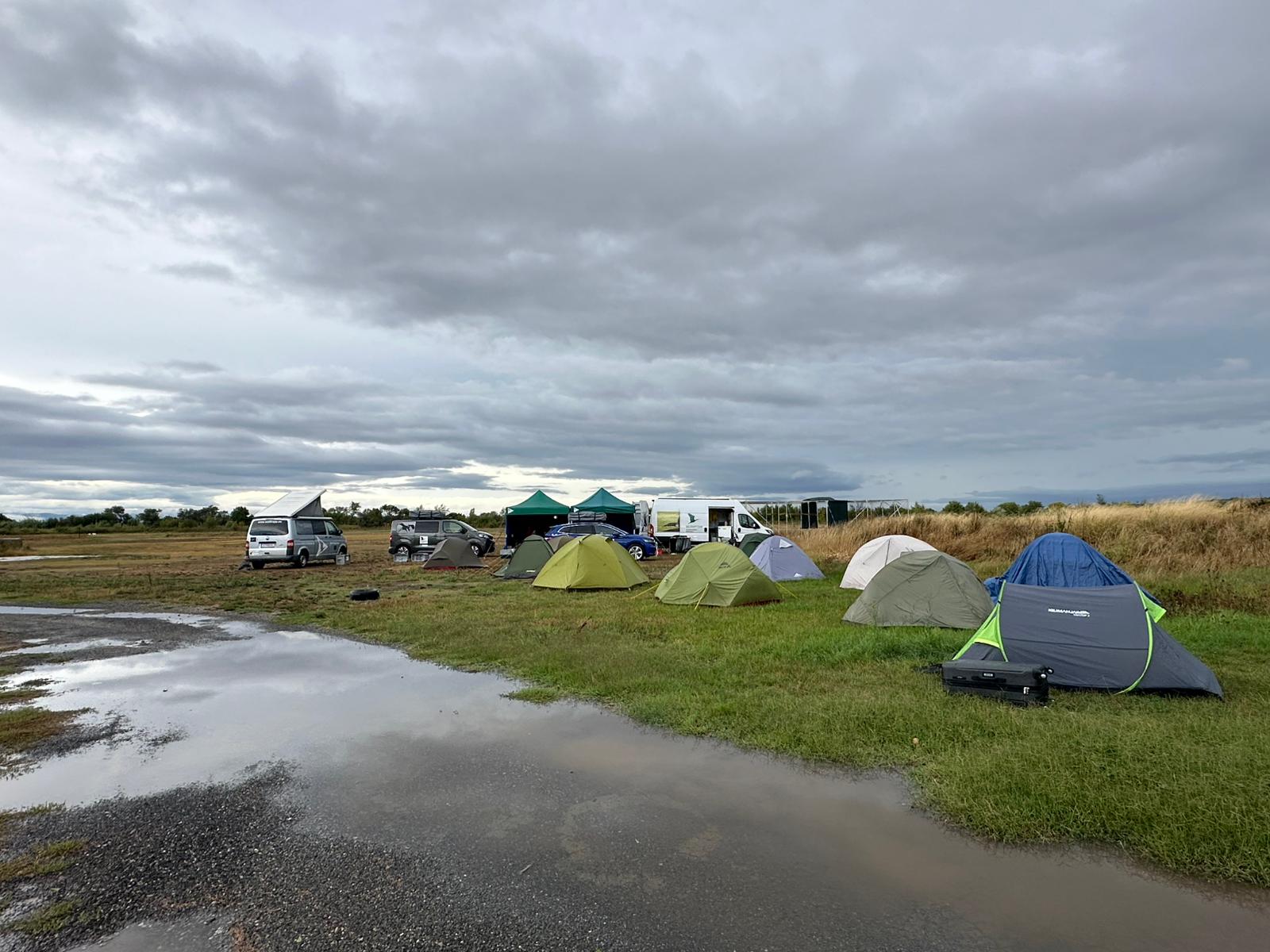
September 25th 2025
We have now been in Narbonne for five days. Unfortunately, the weather has been persistently windy, preventing us from carrying out any flight training with the birds so far. Our hopes are set on tomorrow, Friday, September 26th – perhaps we will finally be able to attempt a flight and give the birds the chance to orient themselves in this new environment.
One way or another, tomorrow will bring the next stage of our journey: either the birds will accompany us in flight to Ordis, or – should the attempt fail – we will transport them there by car. In any case, Ordis will mark both our next and final stop on this expedition.
📸 K. Ebel
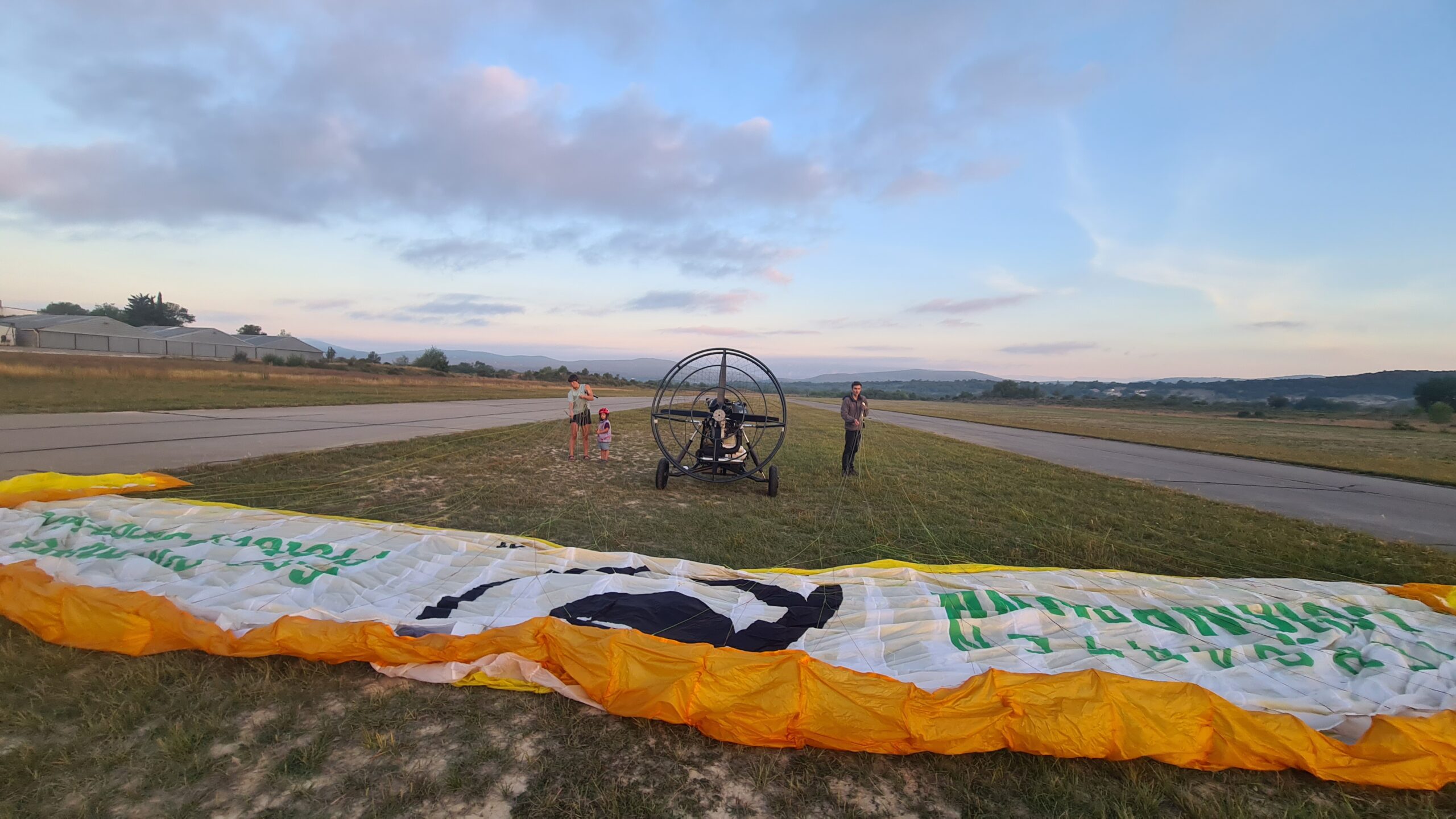
September 20th 2025
After just one night in Saint-Martin-de-Londres and an orientation flight this morning, we are now setting off by car to our next destination: Narbonne. We expect to stay there for several days before tackling the Pyrenees.
Despite all our efforts, the birds can now only be motivated for local flights. The consistent training has borne fruit – the animals are attentive and respond well to the calls of their two foster parents – yet they follow the aircraft only for short distances before turning back. Unfortunately, the training deficit from the summer can no longer be made up.
All we can do now is give the birds the opportunity for local flights at each stage – and thus the chance to string these places together like pearls on a necklace, from the breeding grounds to the wintering area. We hope that in this way, as adults, they will be able to find their way back to Bavaria.
📸 J. Fritz
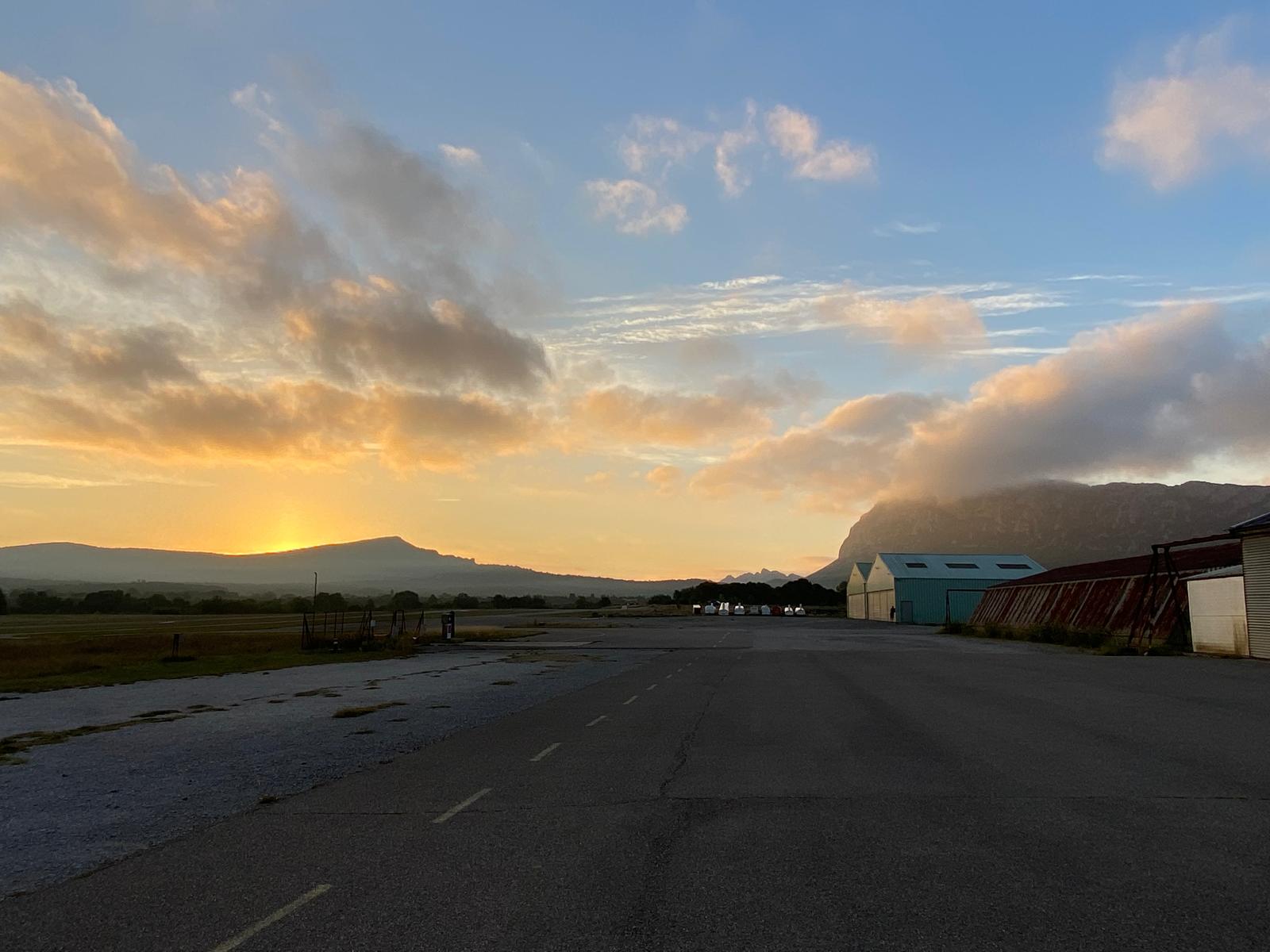
September 19th 2025
By now well-practiced in the routine, the foster mothers packed all 29 of their protégés into the transport boxes this morning. The team then set off for the airfield at Saint-Martin-de-Londres. Upon arrival, it slowly dawned on us that we had already made it far to the south: rugged mountains and the scent of pines welcomed us.
However, we won’t be able to enjoy this impressive landscape and our small tent camp in a little woodland for long – tomorrow, after another orientation flight, we are already planning to continue on to Narbonne.
📸 B.Steininger
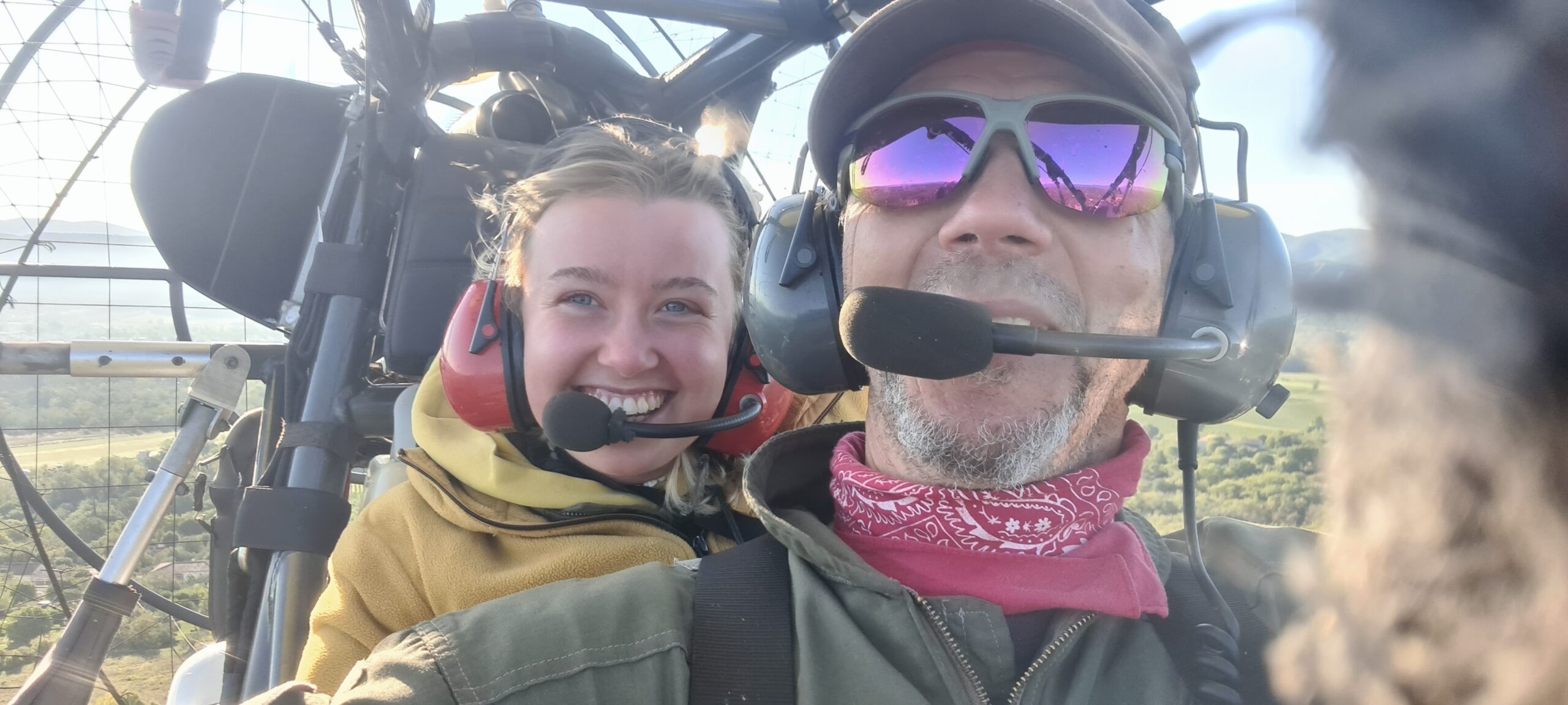
September 18th 2025
In Ruoms, the birds were at least willing to make a few circuits of the airfield yesterday. We hope this will help them gain some orientation for future flight routes. Tomorrow we will conclude our stay here with a taxiing exercise – which the birds usually master with flying colors – before setting off for Saint-Martin-de-Londres.
Over these now quite summery days, the team has at least been able to enjoy the beautiful surroundings and refresh themselves in the waters of the Ardèche – despite the lack of a shower.
📸 J. Fritz

September 16th 2025
Today we decided to make a local training flight with the birds, knowing that due to strong winds we would not be able to leave the airfield by much. Since orientation flights in Ruoms seem more important for the birds given the geographic situation, the team set off in convoy to the next stage location. The goal there is to familiarize the birds with this area as well through orientation flights.
📸 J. Fritz
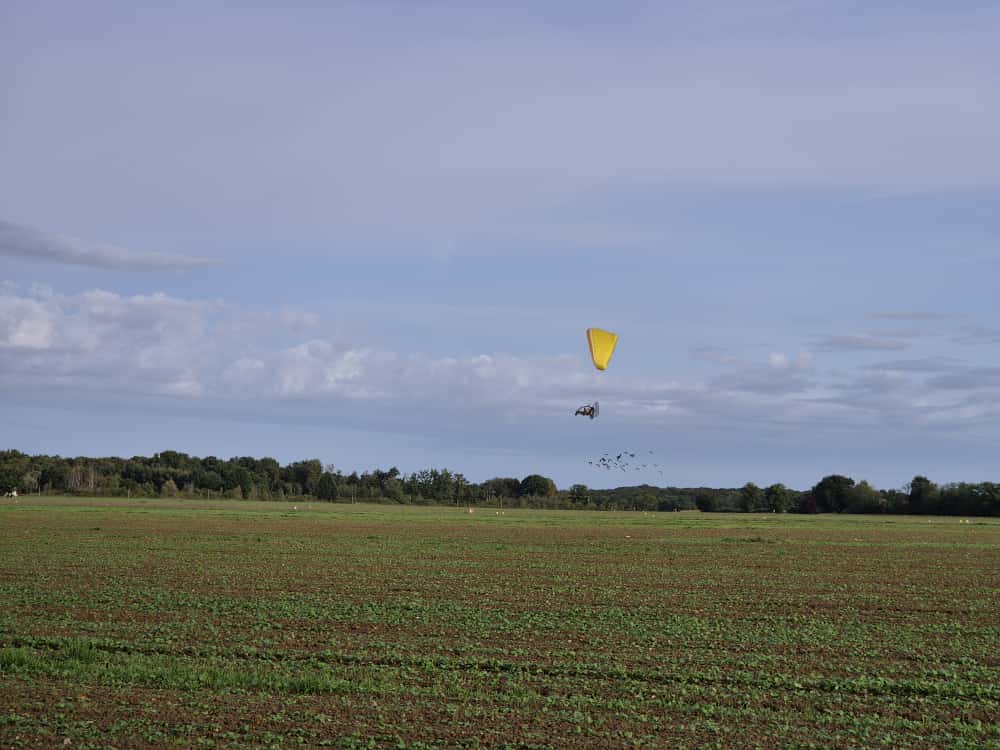
September 13th 2025
After several days in Lons-le-Saunier, we took advantage of today’s good weather to make another flight attempt with the birds. Even though they are still not following reliably, these orientation flights at least give them an overview of the area. After a record-breaking aviary dismantling in just 30 minutes, we left Lons-le-Saunier behind and drove on to Pérouges. We also plan to use our stay here for training: taxiing practice without the wing, as well as local flights above the airfield.
We intend to continue to Ruoms on Tuesday or Wednesday. Until then, this stopover will also serve as a well-deserved rest for the birds, the foster mothers, and the rest of the team.
📸 C. Renner
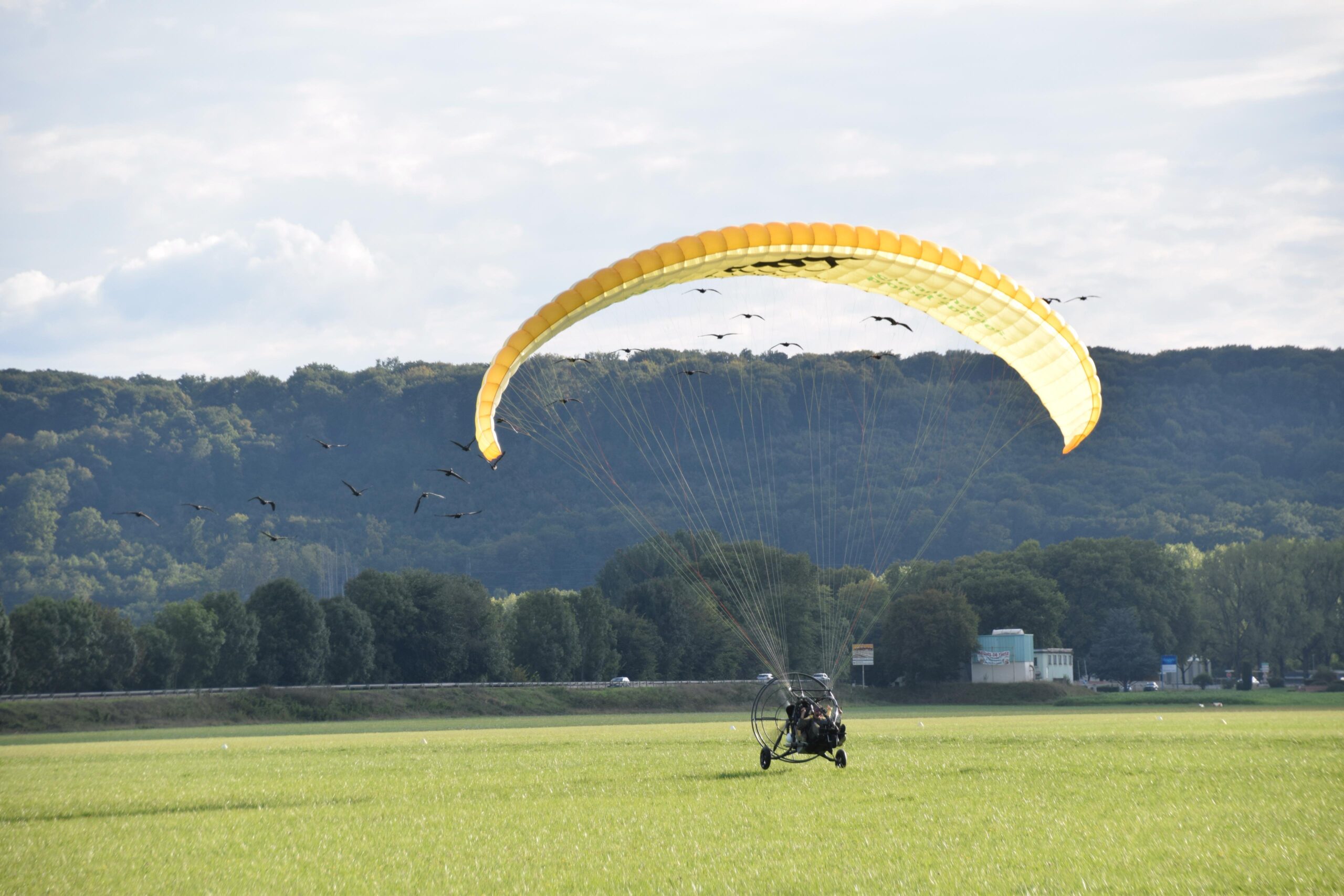
September 12th 2025
Also in Besançon-Thise, the situation has not improved. After the morning fog lifted yesterday, we actually had perfect flying conditions. We relied on a small, particularly reliable group of 11 birds – but unfortunately, they did not follow the aircraft. A second attempt with the entire group was also unsuccessful. At least all the birds were able to circle above the airfield and orient themselves.
We are often asked whether the birds could simply be transported directly to the wintering area. Our many years of experience show that birds which are entirely transported have only a very low probability of returning to their breeding grounds as adults. The more they are able to fly themselves during the human-led migration, the higher their chances of returning.
In line with this principle, we are trying to fly with the birds as much as possible, even in this very difficult year. At the very least, they should have the opportunity to orient themselves in flight again and again along the migration route, as they did here in Besançon-Thise.
This still gives them a realistic chance of returning to Bavaria later on. And should they not succeed, they can at least become part of the newly established sedentary breeding colony in Catalonia – a good alternative both for the birds and for the conservation project.
With stormy weather today, we are moving from Besançon-Thise to Lons-le-Saunier, where we will sit out this bad-weather phase before making another flight attempt.
📸 H. Wehner
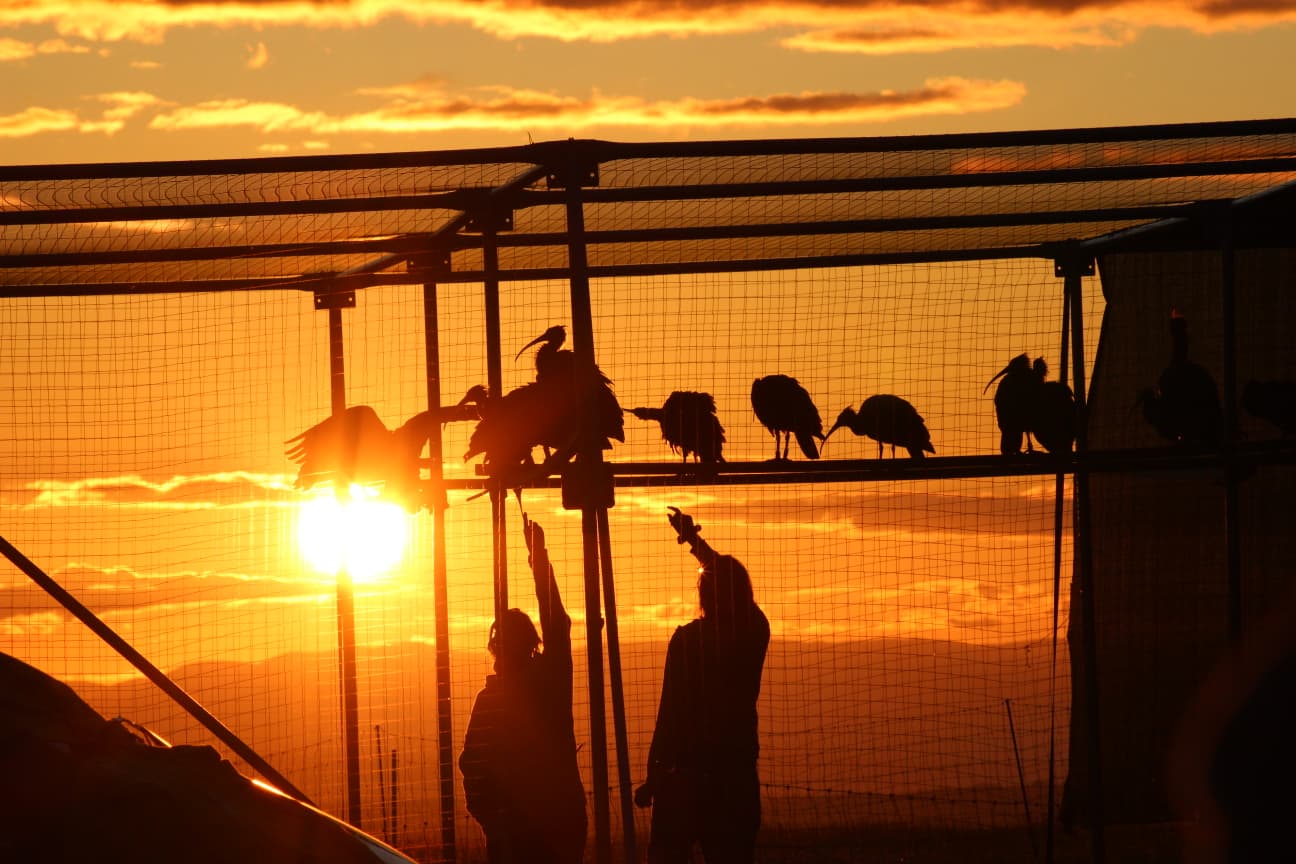
September 5th 2025
On Sunday the 7th, after being grounded in Hütten-Hotzenwald for two days due to strong winds, we set out for France.
Unfortunately, the birds followed us only for a short distance. After just a few minutes of flight, we landed with seven birds at a small airfield. The rest of the group scattered in different directions, but most of them returned within a few hours to the aviary in Hütten-Hotzenwald, which the ground team had dismantled and rebuilt.
One bird, however, flew across the border into Switzerland and spent the night there. Fortunately, it returned the following afternoon.
Given the increasingly unfavorable weather conditions, we decided to transport the birds by car to Besançon-Thise on Tuesday.
Our travel day went smoothly, and we finally arrived in France with the hope of still experiencing some good flying days in the Rhône Valley.
📸 C. Demel
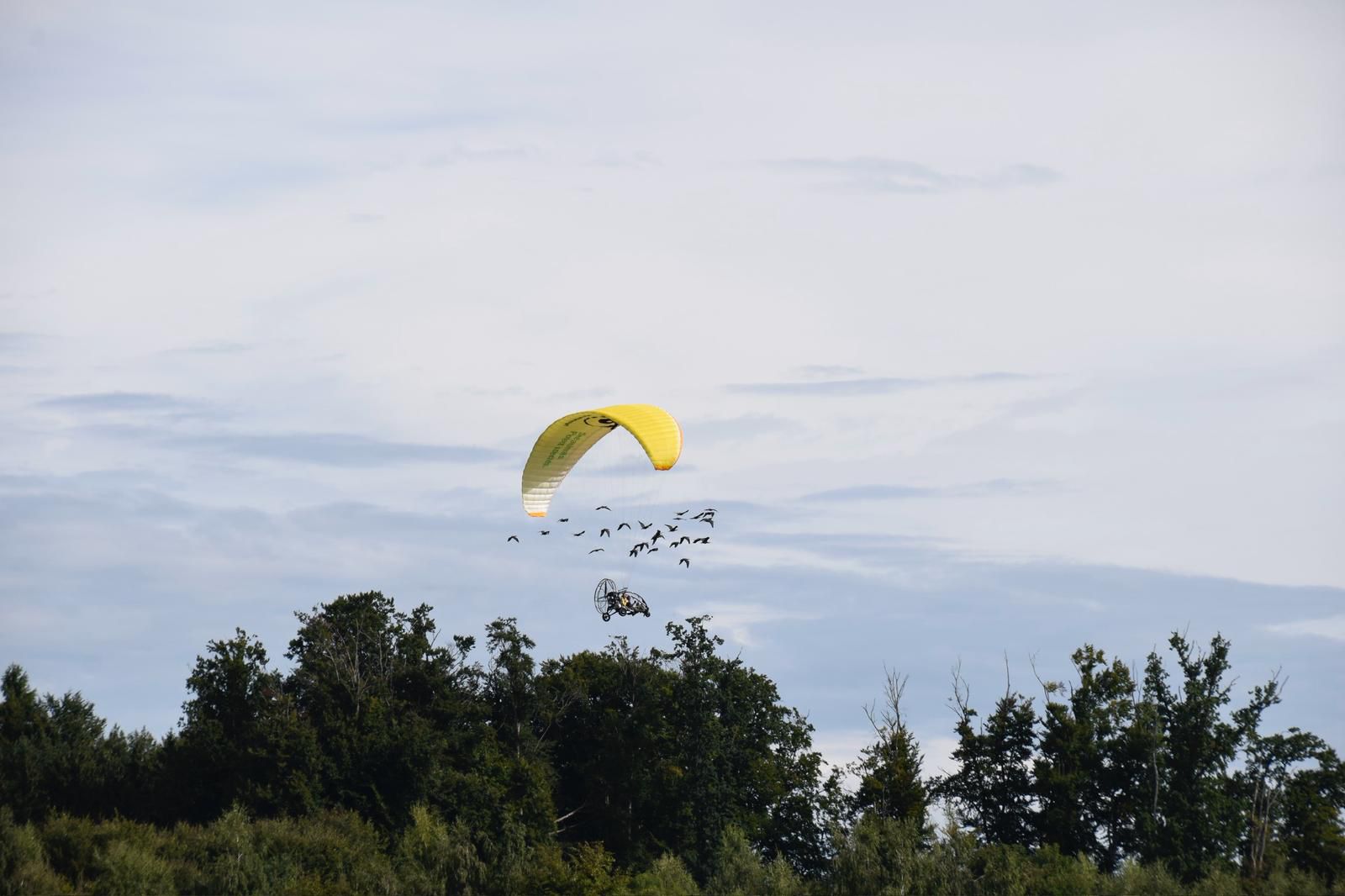
September 5th 2025
Yesterday was an eventful and encouraging day. All the birds followed us wonderfully from the Kißlegg airfield – finally! For the first time, the team could sense a growing migration spirit. The birds followed reliably: at times close to the aircraft, at times as a separate group, even showing the first signs of forming an energy-efficient flight formation.
However, the situation changed 13 km before reaching Heiligenberg airfield. The birds began circling, got lost for a short while, and were eventually found again by the ground crew in a meadow. From there, they followed the microlight to the nearby Berg airfield.
The next attempt to take off, after a short break, was unsuccessful – the birds simply didn’t want to continue flying. We therefore decided to transport them to Hütten-Hotzenwald airfield near the French border, where we rebuilt the aviary in pouring rain. The night was cold, the morning foggy – but in the end, the sun always comes out.
We remain optimistic that the birds will follow us again on our next flight stage into France, which we expect to set out on Sunday.
📷: H. Wehner

September 2nd 2025
In the end, we did not fly to Kißlegg the next day as originally planned. Instead, we decided to extend our stay in Paterzell for another week. The reason was that the birds were not flying as expected, and we wanted to give them more time for training.
Throughout the week, we trained with the birds by moving the microlight along the runway while they followed in the air. Later that week, on Sunday, August 31st, we made another flight attempt. Unfortunately, it was not successful.
Because of this, we decided to transport the birds to our next stop in Kißlegg by car on Monday, so as not to lose more valuable time. The travel day passed smoothly. Late in the night we were surprised by a thunderstorm but the birds and the aviary weathered the storm well.
Tomorrow we will attempt to fly to Binningen.


August 21st 2025
Unfortunately, our first flight from Taching to Paterzell did not pass as well as we would have hoped. More than half of the birds returned to Taching shortly after take-of. Therefore all birds had to be brought to Paterzell by car. This poor first result was potentially due to a lack of training of the birds. The training this year could not proceed as well as in previous years, due to poor weather conditions.
Although our first flight did not pass as well as expected, we are very hopeful that our next flight day will be successful. Tomorrow, we are leaving Paterzell to fly to Kißlegg.

July 27th 2025
The last few weeks have been emotionally challenging for us.
Strong winds and rain made training almost impossible, so we are a little bit behind schedule. But even worse, there were several tragic accidents during the few days of flying.
First, one bird broke its leg. It was immediately taken to Vienna for surgery, but cannot migrate due to the healing time. Shortly afterwards, three birds collided with a power line – one died, two escaped with abrasions. Just two days later, another bird was so badly injured that both legs were broken. Sadly, it had to be put down.
We are now hoping for stable weather conditions, accident-free training and safe preparation for the upcoming migration.
 : C. Renner
: C. Renner
July 1st 2025
 : C. Renner
: C. Renner
June 27th 2025
 : C. Renner
: C. Renner
June 19th 2025
The 1st free flight took place last Saturday. The gates of the aviary were opened and all the Northern Bald Ibises took off immediately, flying off in all directions. By the evening, 31 birds were back, only one was sorely missed. The following day we searched tirelessly for him, we were even able to see him briefly but he was immediately attacked by a buzzard and disappeared from our field of vision. On Monday morning he actually returned to the aviary on his own and the relief in the team was absolutely palpable.
The following two free flights were very good, the birds did not fly so far away and always followed the instructions of the foster parents.


June 12th 2025
The first free flight is coming up soon!
They are currently training hard for this. Initially, the flying machine was only shown to the Northern Bald Ibises and pushed in front of the aviary. In the meantime, the engine has already been started and the foster mothers drove it along in front of the
aviary so that the birds can get used to the sound of the engine.
We are very excited to see what the first free flight will be like and hope for the best.


May 22nd 2025
Would you like to visit us in Taching am See, get a short guided tour and observe the Northern Bald Ibises from a distance?
Then come and visit us!
From 1st of June until the 27th of July, you can visit us every Friday, Saturday and Sunday from 3-5 PM.
Address:
Schröckenbauer 1
83373 Taching am See
Germany
We look forward to welcome you!
Note: please leave your dogs at home and do not wear yellow clothing.


May 13th 2025


April 29th 2025
All of our 32 Northern Bald Ibis chicks are now eating with a good appetite, which is why our two foster parents Johanna and Marie have now started the famous “Komm komm Waldi komm komm” song during feeding. The Northern Bald Ibises thus associate the song with something positive, which means that the birds always listen to and pay particular attention to their foster parents during the song. This is very important for the migration this summer so that the birds follow the call during the flight.
Our youngest Northern Bald Ibis chick “Fasabi” is now 19 days old, which means that the foster mothers can finally enjoy their first coffee.
The weeks before all foster parents have a strict caffeine, nicotine, medicine and alcohol ban as they enrich the birds food with their own saliva to add digestive enzymes. This is because Northern Bald Ibises naturally feed their offspring with digested food mash.


April 14th 2025
After the third and final collection, our group of birds is now complete:
32 chippy Northern Bald Ibis chicks are currently being cared for around the clock by their two foster parents in the hand rearing container, located in the backstage area of Rosegg Zoo.
Thanks to the good weather over the past week, the chicks had an excellent start to their adventure – all of them were well-fed and in good health when they were handed over to their foster mothers.


April 4th 2025
The first chicks are collected at Rosegg Zoo and given into the care of this year’s foster-parent team, Marie-Luise Batzdorf & Johanna Haas.














